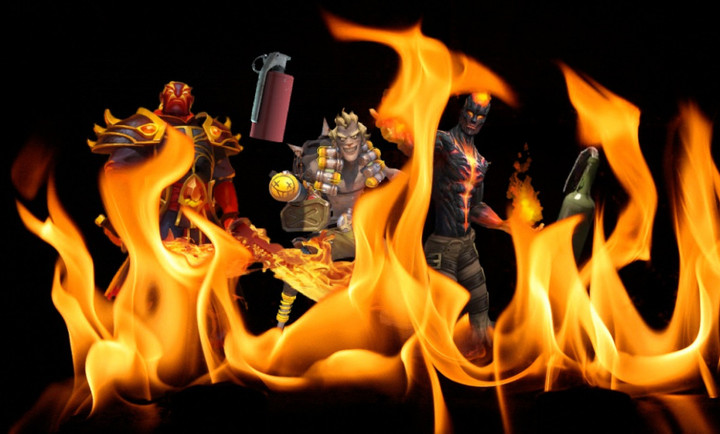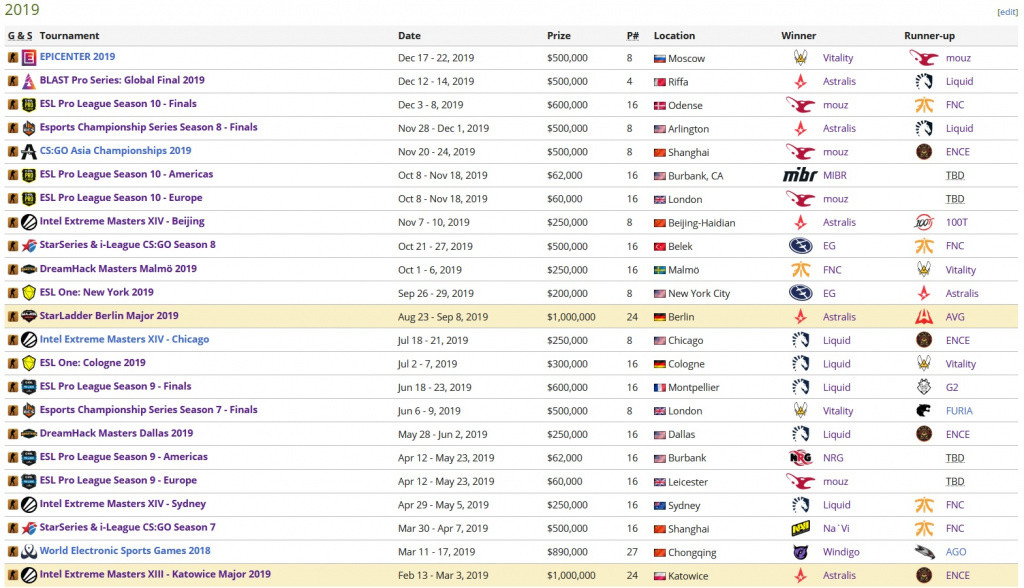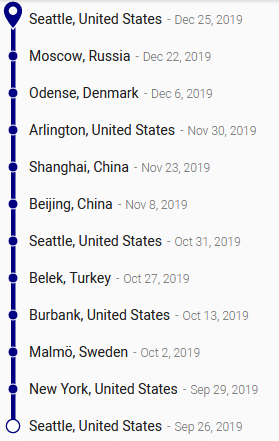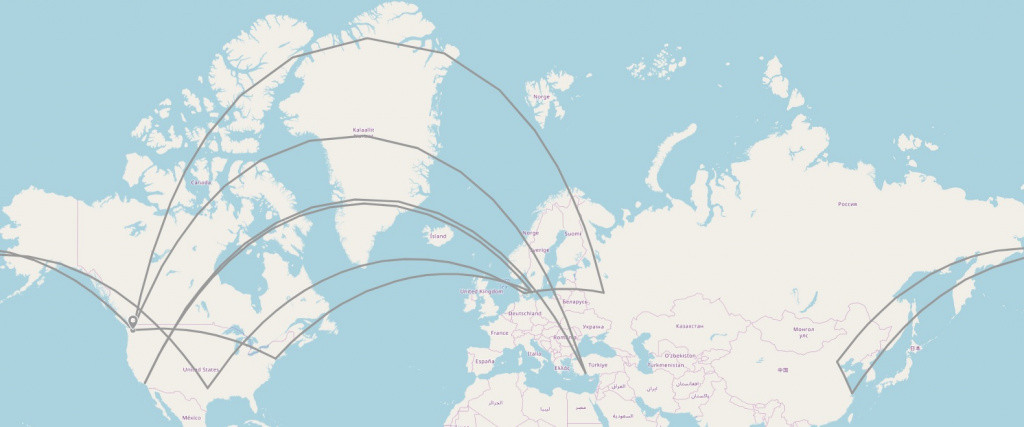The problem of burnout remains prevalent across most esports titles. Whether its endless days of competition with early starts and late finishes, constant travel, streaming requirements of up to 120 hours per week even if not on an active roster and a general uncertainty about the future, most games see those involved experience burnout in one form or another during their careers.
Putting the Global in Global Offensive
In CS:GO, oversaturation of events and the associated burnout is a widely discussed topic.
In 2019, BLAST Pro Series tournaments and DreamHack Opens also took place as A-Tier tournaments so aren't listed (Credit: Liquipedia)
Recently, Team Vitality's in-game leader Alex "ALEX" McMeekin posted a Twitlonger explaining his decision to move away from competing professionally due to the volume of travel that would be taking place throughout 2020.
While on Team LDLC, ALEX played 47 events throughout 2018 with most taking place online. 27 events in 2019 with Vitality totalled 36 weeks of travel for the team even with 10 of these being online competitions including ECS Seasons and online qualifiers for prestigious tourneys. Over two-thirds of the year spent travelling leaves little room for practice, downtime and a life outside of the game.
Global circumstances have seen the early months no longer involving copious travel or LAN tournaments but the problems would still arise by the end of this year as the full wave of tournaments from numerous organisers flood in.
Evil Geniuses' schedule at the end of 2019 saw the roster travel between North America, Europe and Asia in various patterns, with the majority of these taking place in a span of just a few weeks.
The travel itinerary for Evil Geniuses with Seattle, EG's headquarters, used to represent returning to the US throughout 2019 (Credit: Travelmap)
EG had to fly directly after winning the ESL One New York grand final to land in Sweden on time for the group stage of the EPL Finals.
Off to Malmo. Made our flight with 1 minute to spare, way too close bro. Tournaments need to communicate so this stuff doesn't happen. Teams are flying 2 hours after their grand final. Also sucks we didn't get a chance for fan signings.
— Ethan (@The_nahtE) September 30, 2019
Astralis’ in-game leader Lukas "gla1ve" Rossander also commented on having three big finals for ESL Pro League, ECS and BLAST Pro Series all within two weeks of each other saying that in future the team would have to consider declining tournaments if there are too many in a short timespan.
Teams often say they might skip events but actual absences are rare. Team Liquid before their incredible summer run initially declined an invitation to ESL One Cologne 2019 before reclaiming their spot through a qualifier hosted to fill the space.
Duncan "Thorin" Shields' message from during BLAST Premier Spring Season earlier this year addressed the issue of player burnout.
Tennis is brought up as an example of a traditional sport that has players fly all over the world. The difference between tennis and CS:GO is that in the former, the calendar generally moves from east to west, with the grand slams starting with the Australian Open and ending with the US Open and surrounding tournaments predominantly taking place nearby.
The best players can be more selective about where they travel and it is unlikely that a top player like Rafael Nadal will ever have an itinerary ressembling Evil Geniuses.
CS:GO's open ecosystem makes a logical sweep of the world for the best teams rather than jumping across time zones difficult to accomplish.
Endless League of Legends
The LEC, LCS and other global leagues run for nine consecutive weeks per split, with the Mid-Season Invitational, Rift Rivals and World Championships taking place in the calendar and leaving very little actual downtime.
North America saw Doublelift benched due to a drop in motivation, but he did make a return less than a week later in Team Liquid's defeat against Immortals before the LCS was indefinitely suspended due to the coronavirus outbreak.
I'm benched because I had no motivation until very recently. Being sick and unable to compete gave me my passion back, but too late. I'm sorry towards every one of my teammates and I'll be working from now on to regain their trust.
— Yiliang Peng (@TLDoublelift) March 4, 2020
This was not the first time the bot laner has stepped back from professional play, doing so in ahead of the 2017 Spring Split before he was loaned out to Team Liquid. In the same year, Fnatic's Martin "Rekkles" Larsson left the starting roster as a growing mage presence in the bot lane meta was hard to adapt to for a player known for playing marksmen.
League of Legends requires a near-constant focus in order to keep up with buffs, nerfs, new champions, items and changes not just for your own team but in ways that could shake up the way opponents play. While a coach or analyst might spot a strength or weakness, it is up to the players to use this to its full potential and failure to do so quickly or well enough can often be a death sentence.
The game also sees the young dominate and the gap in time for the average player to be at their strongest at the top level of play is narrow compared to other titles. The average age of professional League of Legends players from across the four major leagues was just 22 last year. One of Europe's best players Luka "Perkz" Perković is only 21 years old and has been competing at a high level since he was still in full time education and is now considered a veteran of the game.
The flipside of this is that once you are successful, the idea that there is no turning back and you must continue to play as stepping away for any time could see those same young prodigies take your place while not having the same foundations to fall back on that others might have.
Overwatch League isn't coming home
Overwatch League introduced homestand matches for the 2020 Season for all teams requiring varying amounts of travel for the franchised teams. The coronavirus outbreak saw the cancellation of all homestand events but the initial plan seemed set to add even more pressure on a league that already dominates the calendar with the number of matches played.
As explained by Sascha "Yiska" Heinisch for GGRecon, London Spitfire would have been required to travel just under 76,500 miles during the year around two homestand events while Washington Justice benefited from hosting the most homestand matches with 21,328 miles of scheduled travel and 10 homestand games, the lowest out of all 20 teams. With a range between 19 and 34 trips for each team, the sheer volume of flight time and lack of practice was a genuine concern for many.
While a team might be based in a particular city or state, the players will rarely be from these areas and so homestand games are a formality rather than an opportunity to be closer to home in any way.
In addition to this, many teams have intense practice schedules. Shanghai Dragons had intense 12-hour days for their players for practice and scrims even though the team infamously failed to win a single match and went 0-40 in the inaugural OWL season.
In that first season, the league scheduled three midseason breaks of less than two weeks, often used for further practice rather than time off as patches often dropped in these times and players did not want to fall behind. Blizzard also struggled with balancing issues, finding ways to deal with a stale GOATs meta that has led to the 2-2-2 role lock and a rotating pool of champions as buffs and nerfs were found to be ineffective at solving the game's problems.
It is perhaps no surprise that Overwatch's professional scene had an abnormally high rate of retirement even among some of its best and more popular players.
Former Dallas Fuel player Félix "xQc" Lengyel turned to variety streaming over grinding Overwatch to build his community. This isn’t unique to Overwatch though as Michael "shroud" Grzesiek left CS:GO and Tyler "Ninja" Blevins got his start in Halo and other battle royales like H1Z1 before Fortnite.
Disconnect
A busy schedule is something any professional can expect in both traditional sports and esports. Practice individually and as a team, bootcamps and scrims all need to fit around the matches themselves and any potential travel to events.
In CS:GO, a single best-of-three series can go on for hours and gruelling best-of-five grand finals take up an entire day. Being part of a league also means games that can take place at varying times throughout the day and any technical issues can see matches go on well into the night.
"you're just sitting there, playing computer games?"
— Maikel Bill (@maikelele) March 9, 2020
People will never understand how exhausting a game of CS:GO can be, especially when it's really close games with OT's.
3-5 hours of CONSTANT communication both in and out, you need to be insanely pricise in everything you do.
Trying to build good routines while constantly away from home, friends and family when many games have no consistency is a big ask and the drain is something a good salary can’t always make up for.
The ability to just disconnect is difficult in an industry that tends to demand constant digital attention. Numerous games allow the tracking of play hours or matches played which allows fans to check up on top players. Wanting to unwind by playing the same title you compete on isn't always easy and playing other games is also something that can draw criticism from their own fanbases and communities.
Esports is also an industry where social media is all but essential. Building a personal brand and connecting to a fanbase is important but the dark side of social media sees threats and insults bombarding figures constantly at all levels. This can often be aimed at family or sent to them directly, dragging people unfamiliar with the gaming world into its unpleasant depths.
CS:GO player Kristian "k0nfig" Wienecke even had an employee of the AVANGAR organisation message him after the employee in question lost a bet and decided to let k0nfig know how he felt about it.
Tbh this shit pisses me off pic.twitter.com/SvazEC4yAR
— Kristian Wienecke (@k0nfigCS) October 14, 2018
While AVANGAR promptly fired him and the usual angry threats players get are empty, a BLAST Pro Series event in Moscow last year saw YouTuber Simon Wilson enter the venue with no ticket, no pass, no credentials and no checks, showing it all in a video titled 'MOSCOW, RUSSIA WITH NO MONEY - DAY 1' on the platform.
If this had not been a vlogger but instead a particularly disgruntled fan, there would have been serious questions for the security at the event to answer. Especially concerning is the fact the event took place just over a year since the Jacksonville Landing shooting that saw a lone gunman open fire at a Madden NFL 19 tournament.
Talent
The burnout is not exclusive to players. Talent also have to travel and there is a huge pressure to be continuously on the circuit. Back in 2018, Henry "HenryG" Greer spoke to RealSport and said that he found himself "working abroad for 300 days a year, for three years" and that it had a detrimental effect on relationships with other people and his own sanity.
Matthew "Sadokist" Trivett, with whom HenryG cast hundreds of matches over multiple years before a split last year at the StarLadder Berlin Major 2019, has also seen the effect of burnout and has taken on other roles besides casting in recent months.
Some talent make regular appearances during leagues or events, the grind for talent not specifically tied to a specific game, league or organiser can be intense.
An event you might expect to be hired for could choose to go for a different option, fellow talent could undercut for the opportunity or it might simply clash with another offer.
All I’m gunna say is when things get back to normal with events/touring/shows if ANYONE is undercutting I’m name naming & shamming.
— Eric Ananmalay (@ericananmalay) March 13, 2020
Lot of us just had 4+ months of our income stream vanish and will need to hit the group running when this blows over.
Don’t be that guy. pic.twitter.com/QSuGqXbXaT
Fans might be disappointed when events are cancelled in light of a crisis such as the ongoing coronavirus outbreak but for talent that relies on events to do their job, it is a much more serious consequence beyond their control.
This applies to content creators in the space too. While those that write can still produce something for now, those requiring events such as photographers, videographers and interviewers who need to pay their bills, build portfolios and increase their exposure (no pun intended) are already out of pocket.
Compromise
While topics like gaming addiction can be addressed and often ridiculed, the real consequences to the lives of those involved in the professional esports circuit should be given more attention.
Organisations willing to spend six figures on players should be interested in spending a fraction of that on sports psychologists and other parts of the wider team to manage the more obvious effects of the lifestyle they are expecting teams to lead.
For talent, addressing issues like late payments and tournament organisers not informing talent whether they are hired until the eleventh hour would help alleviate some of the stress that can contribute to burnout.

 No ads, our video library,
No ads, our video library,




